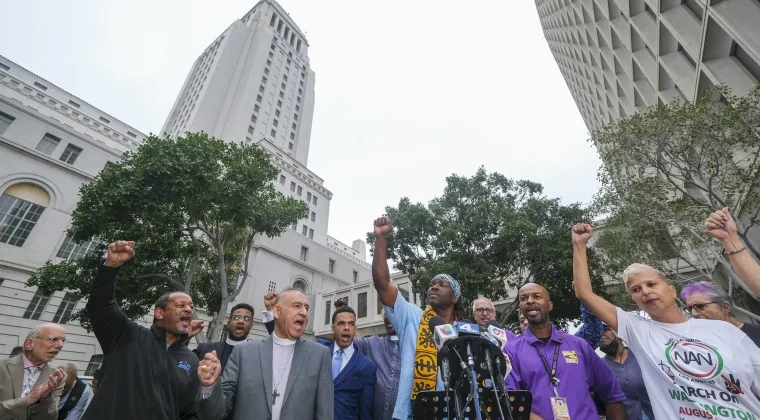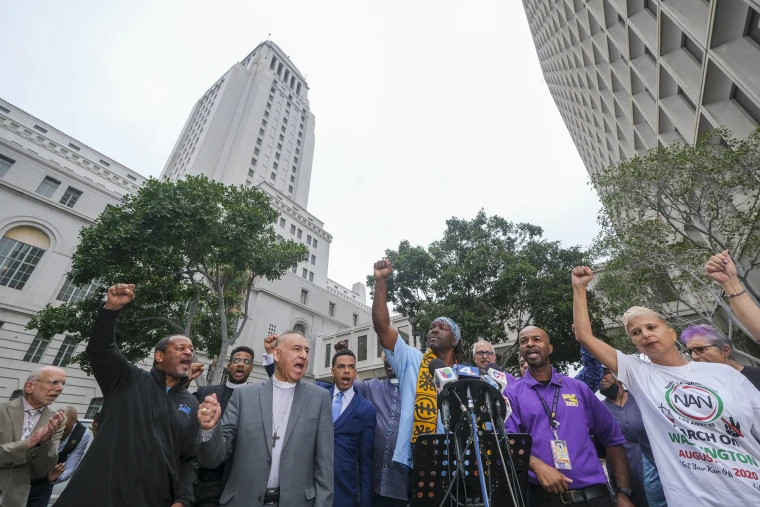

David Brooks nails it:
Besides being offended by the racist comments made by members of the Los Angeles City Council — as so many people were — I was also struck by the underlying worldview revealed during their leaked conversation.
Council President Nury Martinez — who has since resigned from the Council — along with two colleagues and a labor ally talked about a range of subjects, including redistricting, but two assumptions undergirded much of what they said. Their first assumption was that America is divided into monolithic racial blocs. The world they take for granted is not a world of persons; it’s a world of rigid racial categories.
At one point Martinez vulgarly derided someone because “he’s with the Blacks.” You’re either with one racial army or you’re with another.
The second assumption was that these monolithic racial blocs are locked in a never-ending ethnic war for power. The core topic of their conversation was to redraw Council districts to benefit Latino leaders.
“It’s real simple,” one of the participants in the conversation said at one point. “You got 100 people, right? Fifty-two of them are Mexicano. I feel pretty good about it. I feel pretty good about my chances of beating your ass.”
Those two assumptions didn’t come out of nowhere. We have had a long-running debate in this country over how to think about racial categories. On the one side there are those, often associated with Ibram X. Kendi and others, who see American society as a conflict between oppressor and oppressed groups. They center race and race consciousness when talking about a person’s identity. Justice will come when minority group power is used to push back on white supremacy. “The only remedy to racist discrimination is antiracist discrimination,” is how Kendi puts it.
On the other side, there are others, like Thomas Chatterton Williams, Coleman Hughes and Reihan Salam, who argue that racial categorization itself can be the problem. The concept of systemic racism is built upon crude racial categorization. As Williams puts it, America should fight racism while over the long term getting rid of “the categories that come out of the collision of Africa and Europe in the slave trade and the New World.”
You do that by emphasizing how much all humans have in common and by emphasizing how complex each person’s identity is — that it includes race but so many other things, too. The last thing you want to do is traffic in the sort of racial essentialist categories that were so rampantly on display during that conversation among the City Council members.
That conversation is what happens when the assumptions of the former school of thought are embraced as a matter of course. You don’t get a righteous struggle against oppression. You get a bunch of people who assume that public life is a brutal struggle of group against group, and who are probably going to develop derogatory views of people in rival groups.
Read the rest here.
I agree with David Brooks that one of the problems is zero-sum thinking in regard to race. It is a problem that assumes that for one to benefit, someone else has to be diminished. That is easy to fall into for voting because there are a limited number of seats.
But where I think David Brooks is wrong is in his evaluation of Kendi as a supporter of that zero sum thinking as coming from Kendi’s advocacy of repair of past wrongs.
When Brooks quotes Kendi, “The only remedy to racist discrimination is antiracist discrimination,” it sounds as if that were itself a racist statement if we disregard the history that lead to the discrimination. It is not current discrimination if what we are doing is rectifying past wrongs. There are ways that we can also harm people today in inappropriate ways. But that inappropriateness is not a necessary requirement for rectifying past wrongs.
As an example, if there is a piece of property that was illegally stolen from someone, for instance, as the result of a lynching, it is not wrong for the descendants of that past wrong to think that they have some right to the property. How that property is transferred back matters, but it isn’t that there is not a legitimate claim.
For Brooks to say that Kendi’s claim that “The only remedy to racist discrimination is antiracist discrimination” is itself a form of racial discrimination is to deny that there is a legitimate historical claim to a past wrong.
I agree with Brooks that in the case of LA, zero-sum thinking is part of the problem. But I think we get to that zero-sum thinking because we are not thinking historically and doing the work to understand what has happened previously. And then thinking about today how to rectify those wrongs in ways that are not facilitating new harm.
We can’t get past the false categories of race by denying that there are social realities to race. In the Texas death row case of Andre Thomas that the Supreme Court denied hearing on Tuesday, three of the jurors believed that interracial marriage was inappropriate, which was relevant to a case where a Black man was accused of killing his estranged White wife. And the prosecutor directly played on those jurors by saying that if the jury did not convict Thomas that he, as a Black man, might go free and try to date their white daughters or granddaughters.
The way forward for dealing with race cannot be to deny redress in cases of overt racism because race as a biological category is false. The social reality of racism is still present, even if we know that the biological category of racism is not real.